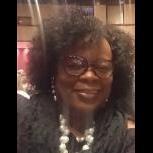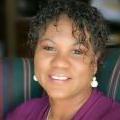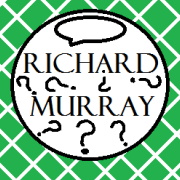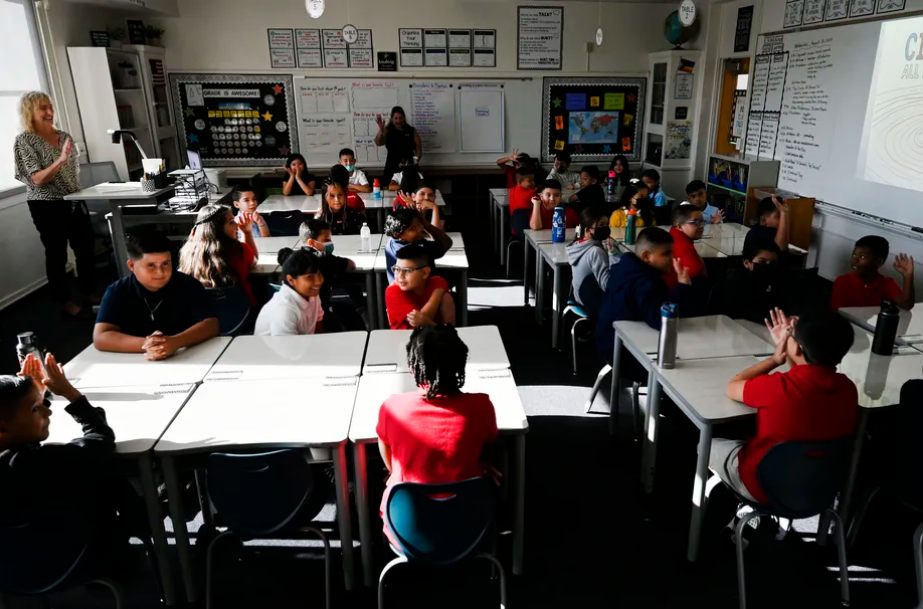-
Posts
3,840 -
Joined
-
Last visited
-
Days Won
119
richardmurray's Achievements
Single Status Update
See all updates by richardmurray
-
Is public school as we know it ending?
Private school vouchers lost a lot of battles, but they may have won the war.By Rachel M. Cohen@rmc031rachel.cohen@voxmedia.com Sep 5, 2023, 7:00am EDT

A fourth grade class at Garfield Elementary School in Long Beach, California, on the first day of school on August 30, 2023. Brittany Murray/MediaNews Group/Long Beach Press-Telegram via Getty Images
As the new school year kicks off, education advocates are bracing for continued attacks on America’s public schools. Yet despite the ongoing culture wars schools have faced in recent years, pollsters find that parents still generally like their kids’ schools, and most of the political opposition has come from those without kids in the public school system.
Cara Fitzpatrick, a Pulitzer Prize-winning journalist and editor at Chalkbeat, is the author of The Death of Public School: How Conservatives Won the War Over Education in America, a book coming out next week that traces the history of the fight to define what “public education” means and who gets to decide. She lays out in clarifying detail the patient strategy conservatives embraced to expand their vision for schooling in America, establishing small school choice programs and then using those experiments to push the boundaries of state and federal law.
Senior policy reporter Rachel Cohen talked with Fitzpatrick about the trajectory of school vouchers as an idea and the future of public schooling in the US. Their conversation has been lightly edited and condensed for clarity.
Rachel Cohen
Your book does a very good job of showing how the boundaries between church and state have eroded over the last few decades, and why the legal arguments for private school vouchers have gotten stronger as a result. I think many readers will be surprised to learn all of this, so emphatically have we been taught that there’s a separation between religion and public institutions.Cara Fitzpatrick
When I started doing the research, I thought there was going to be this very clear line between church and state, but the legal history was murkier, which is why then we’ve seen this progression of cases more recently leaning more toward the religious liberty side of things. One of the questions I often get asked is, “Well, how can you give money to a religious school?” And it’s like, “Here’s 40, 50, 70 years of case law that kind of explains it.” But if you’re not following all those cases, most people find that to be pretty confusing.Rachel Cohen
Yeah, there’s always been a small legal window, and over time conservatives have cleaved that open wider. But we had basically been taught in schools that it was a firm, unchanging boundary.Cara Fitzpatrick
And there have been justices on the Supreme Court who have spoken to the fact that it’s just this tricky area of law, and has been tricky for a long time. And then watching where the Court has gone recently with the Establishment Clause has been kind of wild, actually, because it’s pretty far from where they were when some of these early school voucher cases were litigated. I think it’s gone even farther than school choice advocates thought it would.Rachel Cohen
Where would you say things are today?Cara Fitzpatrick
I think it’s pretty clear that the Supreme Court’s conservative majority has been ruling in favor of religious liberty — not just in school choice cases but in a variety of cases — and I think the window is open for it to go even further than it has. I mean, I’m really interested in where it’s going to go with the religious charter school issue that’s coming out of Oklahoma. I don’t want to predict how that will go, but I think it seems like there’s definitely some room to believe that the conservative majority might eventually sign off on that.Rachel Cohen
Private school vouchers have been picking up steam lately, making political gains in recent years. What were some of the most surprising things you learned about the history of school vouchers, and what, if anything, about that history feels important to understanding the programs we’re seeing today?Cara Fitzpatrick
One of the things that was interesting for me to grapple with was that in the 1950s and ’60s, segregationists in the South essentially used the idea of school vouchers to thwart Brown v. Board of Education. But then in the 1990s and 2000s, school choice advocates argued this was a civil rights issue. So I’ve been trying to sort out and make connections between those two eras.One of the main figures in the book is Polly Williams, who was a Black state representative in Wisconsin who very much viewed vouchers as a tool of empowerment for low-income kids, and particularly low-income kids of color. Her involvement in that issue was really fascinating and kind of linked those two periods in a way. Williams had fears that vouchers would become sort of what they’ve become today: subsidies for everyone, regardless of income.
I think one of the things I really wanted to do with the book was not take a hard and fast position on school choice or on school vouchers, but give someone who might come across a headline about universal school vouchers a way to understand how we got here.
Rachel Cohen
The title of your book is The Death of Public School: How Conservatives Won the War Over Education in America. I hear you on not wanting to take a clear position on vouchers or choice, but I think conservatives may argue it’s simply a new era of public school, not the death of it. I wanted to invite you to talk more about your title.Cara Fitzpatrick
I think the title and subtitle will please no one. But for me, I think it raises that question, right? Does this spell the end for the public school system? That’s something that I had to grapple with throughout because, even just a few years ago, it was very much a talking point from school choice advocates that choice can help drive improvements to traditional public schools. But then in the last couple of years we’ve seen some pretty aggressive attacks on public education by Republicans and the rhetoric has definitely become more extreme, referring to schools as “government indoctrination camps” and things like that. A few prominent conservative school choice advocates have pretty openly said we should really use these school culture wars to push the movement forward.Rachel Cohen
Based on your research, do you see any sort of path for the more liberal, progressive vision of public education to mount a comeback? Is there any sort of competing strategy in the courts or politics?Cara Fitzpatrick
It’s hard to predict. The book is landing — just coincidentally — at this moment in time when school choice is dominating the news cycle and “parental rights” are all over the place. But even just a few years ago, I remember in 2017 a couple people saying to me, “Well, aren’t school vouchers dead?”Education can really change in a short period of time. It does feel to me like Milton Friedman’s side of the debate on the free-market vision for vouchers has really eclipsed what Polly Williams and some of the more progressive voices were about. But I think some of this may depend on how the new choice programs actually play out, including whether people take states up on these universal voucher programs.
Rachel Cohen
Is the lesson here to just stick with a political goal for 50 or 60 years and then eventually you might win?Cara Fitzpatrick
Maybe! It is really fascinating: On vouchers, conservatives have played the long game and it seems to have worked out pretty well for them.Rachel Cohen
There’s often this debate over whether charters or vouchers or tax credit scholarships result in better academic outcomes for students, either through competition or simply by injecting the power of “privateness” into the equation. Did your book lead you to any conclusions or clarity on those questions?Cara Fitzpatrick
I think there’s a pretty solid amount of research at this point — not about universal vouchers, since that’s still kind of new and uncharted territory — but on some of these voucher programs that have existed for a long time. And what researchers have found is that the programs haven’t lived up to the promise of what the early advocates wanted or assumed would happen. I think there was this belief that private schools were just sort of inherently better than public schools, so if you just got more kids in private then all those kids would do better. A lot of the major research studies have shown either the same results for test scores between public and private, or actually a decline in private. And then there’s been a little bit of research on some other life outcomes that have been positive, like showing kids in some of these voucher programs are more likely to graduate.There are a lot of studies out there, some far less rigorous than others, and I think wading through all that can be a little intimidating. What I believe and I wanted the book to show is that this debate in America is really more about values than about outcomes.
Rachel Cohen
We’re in a moment when the conservative legal movement is at its strongest on school choice and teacher unions are in a very weakened position. Can you talk about the role you saw unions play in accelerating or slowing down these policies? How much do you think it matters today that unions are in a less powerful position?Cara Fitzpatrick
Unions were typically opponents of school choice programs, but I didn’t get into the role of specific union leaders in the book with the exception of [former American Federation of Teachers president] Albert Shanker, since he was sort of outside the mold of what a lot of union leaders were saying. But I didn’t see unions’ opposition making a huge difference for the most part. Mostly they become convenient scapegoats in the partisan conversations.With teacher unions, what’s interesting is that a lot of their fears about where the programs would go seem to have come true. Unions warned from the start that this was not in fact going to be just a little experiment, that these programs are not going to be just limited to disadvantaged students, and now we are seeing these universal programs pass.
Unions have played pivotal roles in different places and in moments of time in blocking or slowing school choice, but ultimately I don’t think that they were necessarily going to stop all of this. They stopped some of it. A lot of voucher proposals failed. It’s just that enough of them passed to have this toehold over time.
URL
https://www.vox.com/policy/23847728/public-school-vouchers-choice-cara-fitzpatrick-bookMy Replies in plain to sections of the article above in bold
"Your book does a very good job of showing how the boundaries between church and state have eroded over the last few decades"
One of the problems with the USA in its entirety is the myth of seperation of church and state. It is a false reality, that is advertised as true because the usa doesn't have one religion's potentate running things, but the collective of religions in the usa all are very dominant in their communities as influencers. Again, the jewish community in NYC has schools of failing children, look at my list of relevant posts below."One of the things that was interesting for me to grapple with was that in the 1950s and ’60s, segregationists in the South essentially used the idea of school vouchers to thwart Brown v. Board of Education. "
The tragedy of this point is, Black people of a certain age new this. But the problem in modernity is the modern immigrant community, even if black. They don't know this history, haven't asked, and in many countries outside the USA , the voucher to a school is a status symbol. This goes back to the problem I always have with people concerning immigration in general. Immigrants have to embrace the culture they are coming into. But the USA has this very dysfunctional idea , coming from white europeans that killed native americans, that the immigrants culture is the good and it makes the native better. When it is more functional for the native to be upheld and the immigrant molded into it. NYC is a prime example of this where immigrants culture was used and is of use to undermine people already in the usa."But then in the 1990s and 2000s, school choice advocates argued this was a civil rights issue. So I’ve been trying to sort out and make connections between those two eras."
The black community , specifically the Descended of Enslaved tribe, has a huge role here. What people don't comprehend is that many Black DOSers supported vouchers back in the day as a way to get black kids into schools. They knew whites wouldn't allow merit for thier schools cause the whole point of white schools is to be for white children, so all their plans is to keep the schools and their funding to white children, so the idea was instead of attacking vouchers, put the weight on black children with the whole merit, twice as hard BS speech, and the rest is history.
Black DOSers should had opposed brown vs board of education. Focus on making black schools better financed, not pushing black children into white schools."One of the main figures in the book is Polly Williams, who was a Black state representative in Wisconsin who very much viewed vouchers as a tool of empowerment for low-income kids, and particularly low-income kids of color. Her involvement in that issue was really fascinating and kind of linked those two periods in a way. Williams had fears that vouchers would become sort of what they’ve become today: subsidies for everyone, regardless of income."
And the black community in places like Wisconsin , a mostly white state < 81.9% white is the average> has always been in denial about effective phenotypical legislation. Integration simply has many failures on the largest scale. Integration has worked for individuals but failed for groups but the Black DOS communities leaderhsip in majority in the usa went for it , so, bad strategy."Does this spell the end for the public school system? "
As in Nippon or France, Public School, meaning barely financed schools for poor kids will never go away, the largess of poor children will always exist and will need a school system for those unable to afford or fortunate."But then in the last couple of years we’ve seen some pretty aggressive attacks on public education by Republicans"
The historical truth is Black Southern Republican Elected officials were the ones who pushed public school as an institution. Their idea was to merge the communities through the children but while reconstruction failed and Jim Crow was born, public schools in the south were turned into a two tier system so instead of one school for all children : indigenous, black, white together, it became tiered on various racial grounds. And that would not had been a problem if all three schools systems were financed equally, but they weren't." And what researchers have found is that the programs haven’t lived up to the promise of what the early advocates wanted or assumed would happen."
LINK: https://www.brookings.edu/articles/more-findings-about-school-vouchers-and-test-scores-and-they-are-still-negative/
What saddens me is years ago in early obama era, on smiley and west an advocate of charter schools admitted this and I said this. the fact that all these new schools systems haven't generated different results exposes how many people concerning this issue, native | black | white, are liars or have some negative agenda which clearly is unconcerned with better education. And notice I said all three groups, not merely one. I have been fortunate enough to see offline using my own eyes many black people support charters and vouchers with a clear dysfunction when it comes to better education."What I believe and I wanted the book to show is that this debate in America is really more about values than about outcomes."
I want to rephrase , this is not about results but about outcomes , cause based on results, the entire voucher + charter school movement has been shown to be a hoax, like a lot of things in the USA. The truth is, black individuals supported and support vouchers to get their kids access to opportunity, not to improve their educational quality. To be blunt, this is why so many college students put themselves in debt to go to ivy leagues, calculus doesn't change at the steps of MIT , but MIT has access to far far far more research, development, design, financing opportunities, that smalltown community college."With teacher unions, what’s interesting is that a lot of their fears about where the programs would go seem to have come true. Unions warned from the start that this was not in fact going to be just a little experiment, that these programs are not going to be just limited to disadvantaged students, and now we are seeing these universal programs pass."
Exactly, unionized teachers have been a scapegoat to all sides in the usa for a long time. THis happens because you will always find parents who want their children to be a hybrid of historical figures and when that doesn't happen, the teachers failed, not the child is human and this bolds most true for black dos parents who set the tone for parents not white european en large. Again, black parents treat education as power, as a path to betterment and that philosophy is very dysfunctional in a fiscal capitalistic community, the usa, based on wealth from genocide + slavery. But black dos parents in the usa pushed this as part of their nonviolent BS strategy and the results is here.Relevant Post
The role of the public library is analagous to the role of the public school
https://aalbc.com/tc/profile/6477-richardmurray/?status=1651&type=statusA schools story among other things
https://aalbc.com/tc/profile/6477-richardmurray/?status=1757&type=statusThe role of education in the USA in three parts
https://aalbc.com/tc/profile/6477-richardmurray/?status=1793&type=statusEducation can never satisfy all so a system for all in a intramultiracial human community has problems
https://aalbc.com/tc/profile/6477-richardmurray/?status=1818&type=statusThe idea that the descended of the enslaved plus the latter freely immigrated like them can work to dual betterment side the descended of the enslaving plus the latter freely immigrated like them is a lie- and has failed in education
https://aalbc.com/tc/profile/6477-richardmurray/?status=1929&type=statusJewish Schools allowance for failure in NYC
https://aalbc.com/tc/profile/6477-richardmurray/?status=2064&type=statusThree Kings in the Black DOS Statian community- each had a role in education
https://aalbc.com/tc/profile/6477-richardmurray/?status=2199&type=status
and an amendment
https://aalbc.com/tc/profile/6477-richardmurray/?status=2140&type=statusCost of Living and the need of Public School
https://aalbc.com/tc/profile/6477-richardmurray/?status=2319&type=statusCollege Admissions
https://aalbc.com/tc/profile/6477-richardmurray/?status=2397&type=statusThe Intruder Film
https://aalbc.com/tc/profile/6477-richardmurray/?status=2422&type=status








.thumb.jpg.ed52910791d00308abb8c218695bec88.jpg)



